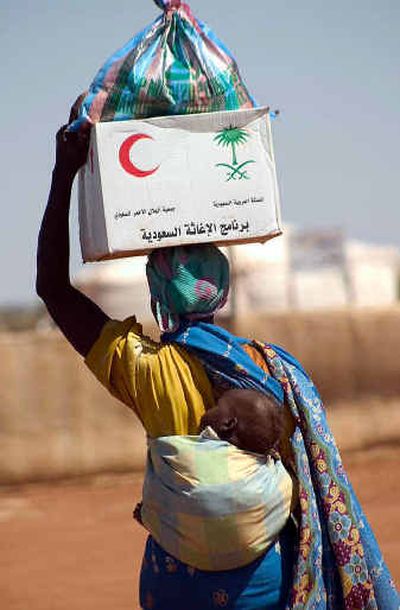Sudan signs peace pact

NYALA, Sudan – With violence increasing and political pressure mounting to end conflict in Sudan’s Darfur region, the government agreed Tuesday to halt military flights over the region and signed a separate agreement to allow free access to aid for the nearly 2 million people displaced by the violence.
At peace talks in the Nigerian capital of Abuja, the government agreed to disarm allied militia fighters known as the Janjaweed. In security agreements signed by the government and rebel parties, both sides agreed to reveal the location of their forces to African Union cease-fire monitors in a war that the United Nations has called the world’s worst humanitarian crisis.
“We still have a long way to go, but the step we have taken this afternoon is a very important step in the right direction,” Nigerian President Olusegun Obasanjo told reporters in Abuja after a signing ceremony.
But he was quick to add, “These documents won’t be worth the paper they are written on if they are not scrupulously implemented on the ground.”
Just a week ago, Sudan’s government called the idea of a no-fly zone “unreasonable” and threatened to shut down the peace talks. But with violence still raging in Darfur’s 20-month conflict between African rebels and pro-government forces, food aid has now been blocked to 200,000 people and large swaths of Darfur are “no-go” areas for U.N. humanitarian workers.
Sudan’s decision comes 10 days before a meeting of the U.N. Security Council, which could have imposed sanctions on the country’s oil industry or taken other punitive measures because of the worsening security situation on the ground in Darfur.
Since a cease-fire agreement was signed in April, it has been violated 180 times, or roughly once a day, the African Union says. The Sudanese government this week also drew international criticism for forcibly moving hundreds of families from one camp near the capital of South Darfur to another camp, where the families said they feared they would be subject to attacks.
Nearly 2 million Africans live in squalid tent cities across Darfur after being driven from their farms by the fighting, which broke out in February 2003 when African tribes rebelled against the Arab-led government.
In retaliation, the United Nations says, the government has bombed villages and armed the Janjaweed militias. Tens of thousands of people have died from hunger, disease and violence; the Bush administration has described the crisis as genocide.
Officials of the Sudanese government said the agreement showed they were working hard for peace in Darfur.
“It is really a landmark agreement for Darfur,” government spokesman Ibrahim Mohammed Ibrahim said in a telephone interview from Abjua. “We are serious and we want to do this.”